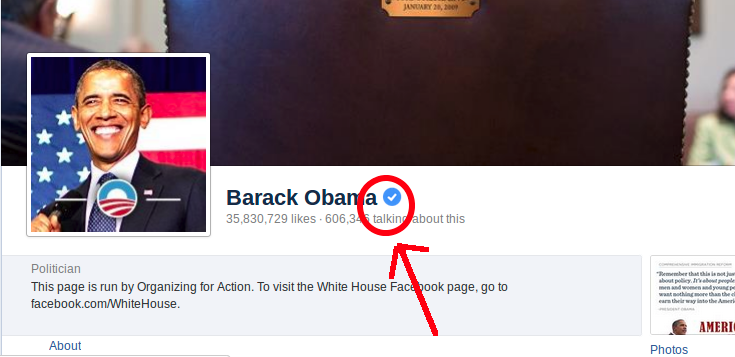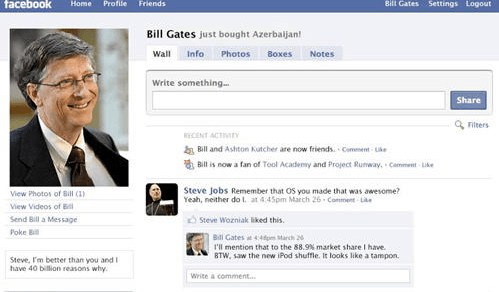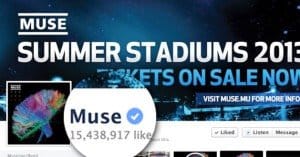 Written by ContentPowered.com
Written by ContentPowered.com
People go absolutely wild for official verification. Twitter is a hotbed for it; anyone of significant enough stature can gain a Twitter verification. This has led to anyone who wants to be thought of as someone applying for verified status. It has also led to a proliferation of accounts who claim they will get you verified status, all you need to do is follow them and send them $5 or maybe just your login information. You know, totally legit-like. Really.
Facebook jumped on the verification train way back in the ancient age of 2013, when we were all younger and a little more invested in Facebook. A wide range of entities have been verified, from Coca-Cola and Mozilla to Justin Bieber and Barack Obama. Yet not everyone can be verified. One of the biggest names in SEO, Moz, isn’t. The Spider-Man movie is, but one of its stars, Kirsten Dunst, isn’t. Of course, her page hasn’t been active since 2012, which probably has something to do with it.
It seems really hit or miss, but it generally seems that the more famous your entity is, the more likely you are to get verification. It makes sense. After all, an imposter could fool a lot more people posing as Coke than posing as Dave from accounting. Specifically, Facebook says “Celebrities and public figures, global brands and businesses, and media entities” can be verified.
The Process
There are two ways to get yourself verified. One is the passive method, and one is the active method.
The passive method is actually a lot more work than it sounds, based on the name. You need to be famous, either as a nationally-recognized personage, entertainer, or media page. Big brands, global brands, hugely popular brands, individual rising star singers and actors, these sorts of entities catch the eye of Facebook.
So how do these people get their verification? Essentially, they are popular enough and recognized enough that Facebook looks at them and says “yup, you deserve verification.” It’s as simple as that. The brand or entity doesn’t need to do anything, they just wake up one day to an email telling them their account has been verified.
What about those of us who think we’re pretty famous, you know, in the right circles? Those of us who consider ourselves prominent personages in our industries, or who just want verification to stop potential impersonation problems? We’re left with the active method.
The active method requires a bit more work on our part than the passive method. The passive method involves being visible until Facebook takes notice. The active method requires that you be more proactive about things. You can’t wait for Facebook to find you, you have to send a petition to Facebook. Now, I don’t mean something on Change.org, no matter how many signatures you get. I mean via their own verification page. Here’s the general process:
- Have a page with a significant number of followers. I’ve seen verified pages with as few as 82,000 followers, though there are probably verified pages with less.
- Have a link to your official website on your Facebook page.
- Make sure your About section is properly filled out with enough information to make sure the page is controlled by you. This probably includes accurate Name/Address/Phone number if applicable.
- Visit this page. This is the contact form for submitting a verification request. If you have a Page that meets the standards required to be verified, it will show up under the “Page you’re requesting to verify” section. Otherwise, it will say “you have no eligible admined pages.”
- Scan and attach images of your driver’s license, your passport, your birth certificate, or articles of incorporation for businesses. Also, include a link to your official website.
- Wait.
After step 6, you have a lot of time on your hands. Facebook will slowly go through their verification queue and will eventually get back to you, probably to tell you that you don’t meet the standards necessary to receive verification. If you are verified, you’ll be notified via email.
Right now, Facebook claims that they are only accepting verification requests from pages that represent celebrities, public figures, sports teams, media entities and entertainment entities.
So, to the original question in the title, is verification only limited to celebrities? Not quite. Many celebrities aren’t verified. In fact, many only have Wikipedia-styled informational pages. One assumes that these celebrities are not active on Facebook as a social media page, and Facebook has created these informational pages to avoid someone else running a fan page or impersonator and becoming the top search result.
Dealing With Impersonators
One of the primary reasons to request verification is when you have to cope with impersonators harming your brand. This can happen to celebrities, small businesses, large businesses and everyone in between. Verification helps users know to trust the right account.
When you find out someone is impersonating you, it can be harmful. You might have to deal with the PR fallout of that account saying something racist, sexist, violent or threatening under your name. You might have to cope with them misleading your customers to their own competing business, or simply stealing their information. In every case, it’s a danger to your business, and you need to deal with it.
The process on Facebook to deal with an impersonator is through a report. You can visit the page in question and click the … icon in the corner of the cover photo. From there, report the account. It will ask you why you want to report it, so tell Facebook the account is impersonating you.
What constitutes impersonation? Technically, a completely unrelated page that just happens to use your logo as its cover photo can be considered impersonation. Facebook says any account that pretends to be you, uses your photos, lists a fake name or doesn’t represent a real person in the first place is a reportable account.
As an added bonus, if you have to deal with an impersonator, reporting them and getting them removed might result in your verification. Facebook would probably rather verify you than deal with impersonators constantly.




I’ve been denied multiple times for getting verified on FB. I have over 100k fans, any idea what could be wrong?